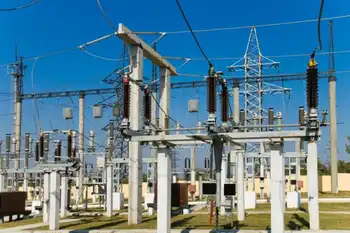Ontarians paying others to use their power
By Toronto Star
NFPA 70e Training - Arc Flash
Our customized live online or in‑person group training can be delivered to your staff at your location.

- Live Online
- 6 hours Instructor-led
- Group Training Available
Some big businesses in Ontario who run 24/7 enjoyed some similar largesse, though itÂ’s impossible to say just how much.
Welcome to springtime in Ontario, when the weather warms, the rivers gush, and the price of power drops not just to zero, but below.
The mild weather stifles demand for both heating and air conditioning, while fast-flowing rivers help pump out power.
The result: Surplus electricity.
And that means some export and business customers actually get paid to use the OntarioÂ’s provinceÂ’s power.
And while the phenomenon only occurs for an hour here and an hour there at present, a report from the province’s power market operator has signaled that it could occur regularly in the future — as often as one day in every seven.
The past week has seen 11 hours in which prices on OntarioÂ’s wholesale market were less than zero:
• On April 11, prices dipped below zero for five hours during the night, going as low as minus 12.2 cents a kilowatt hour.
• On April 10, prices were also negative for five hours, dipping to minus 12.8 cents a kilowatt hour at the lowest.
• The price fell to minus 2.2 cents a kilowatt hour for an hour on April 9.
In all, the provinceÂ’s electricity system paid $1.377 million this past weekend to dispose of the surplus power. And itÂ’s happened before: Ontario has racked up 25 hours of negative prices so far in 2011.
The negative prices, unfortunately, do not mean that householders will get a refund or a credit on their next bill.
Residents are generally locked in to regulated prices, or time of use rates. Others are committed to fixed prices under retail contracts, which donÂ’t vary as market prices rise and fall.
But larger business users who consume more than 250,000 kilowatt hours a year and are charged the market rate for electricity, can actually receive a credit for the power they use when prices are below zero.
So can large customers in neighbouring states and provinces, which trade power back and forth with Ontario. That electricity goes through the hands of traders, who may sell directly to U.S. utilities or to industrial customers.
The trades can occur at greatly varying prices through the day. At times, Ontario may be exporting power to Michigan while itÂ’s importing from Quebec, or vice versa. OntarioÂ’s U.S. trading partners often have higher retail prices than Ontario, while Quebec has much lower retail prices.
Low prices in Ontario are common at this time of year, says Terry Young, vice president of the Independent Electricity System Operator, which runs the provinceÂ’s power market.
Surplus power and negative prices can be an opportunity for businesses that can boost production, said Young.
“There are customers who can respond to this,” he said.
Adam White, who heads the association of Major Power Consumers of Ontario, agrees, but says he’d like to see greater incentives built into the market so that when surpluses develop and prices go negative, Ontario industries are encouraged to soak up the surplus and enjoy the short-term benefit – not export customers.
That would mean designing greater incentives to encourage big users to shut down during summer peaks, when the system is under stress from high demand.
While power surpluses have been modest and intermittent recently, a report earlier this year warned that if no action is taken, surpluses periods will grow. Ontario could have surplus power on its hands one day out of every seven by 2013.
Delicate talks are currently under way with wind generators, to see if there are ways to limit the flow of wind power onto the grid during periods of surplus.
So if some customers are being paid to take OntarioÂ’s power, whoÂ’s paying them?
The answer is, ultimately, that all customers bear the cost of giving away surplus power, or paying others to take it.
That may seem unfair to consumers, who canÂ’t benefit from the giveaway power, but still underwrite the cost.
Energy minister Brad Duguid acknowledges the anomaly, but says consumers have to look at the whole ebb and flow of the market, rather than a few days.
Trade in electricity is continuous, and isolating a few days of trading when the province had surplus power doesnÂ’t show the whole picture, he says.
Most of the time, he said Ontario is selling at a profit.
“When you put it all together, consumers made $1.5 billion since 2006 from our exports.”
That included some days in which Ontario’s neighbours had to dump surplus power — and the Ontario system was paid to take it.
Young of the IESO notes that Ontario businesses that profit occasionally from negative prices also have to take the consequences when prices shoot up during period of high demand.
A business that draws one megawatt of power would have received a credit of about $814 for the 25 hours of negative prices that have occurred so far in 2011, he said. But it would have paid $3,065 to use the same amount of power during the 25 top-priced hours of the year.
Consumers are sheltered from those spikes by regulated prices or fixed price contracts.











